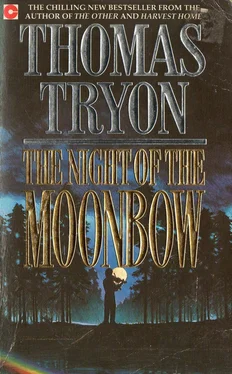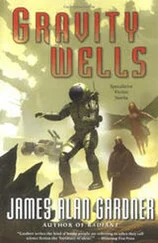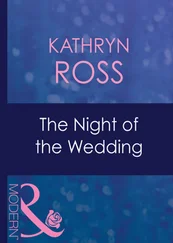Thomas Tryon - The Night of the Moonbow
Здесь есть возможность читать онлайн «Thomas Tryon - The Night of the Moonbow» весь текст электронной книги совершенно бесплатно (целиком полную версию без сокращений). В некоторых случаях можно слушать аудио, скачать через торрент в формате fb2 и присутствует краткое содержание. Жанр: Триллер, на английском языке. Описание произведения, (предисловие) а так же отзывы посетителей доступны на портале библиотеки ЛибКат.
- Название:The Night of the Moonbow
- Автор:
- Жанр:
- Год:неизвестен
- ISBN:нет данных
- Рейтинг книги:3 / 5. Голосов: 1
-
Избранное:Добавить в избранное
- Отзывы:
-
Ваша оценка:
- 60
- 1
- 2
- 3
- 4
- 5
The Night of the Moonbow: краткое содержание, описание и аннотация
Предлагаем к чтению аннотацию, описание, краткое содержание или предисловие (зависит от того, что написал сам автор книги «The Night of the Moonbow»). Если вы не нашли необходимую информацию о книге — напишите в комментариях, мы постараемся отыскать её.
The Night of the Moonbow — читать онлайн бесплатно полную книгу (весь текст) целиком
Ниже представлен текст книги, разбитый по страницам. Система сохранения места последней прочитанной страницы, позволяет с удобством читать онлайн бесплатно книгу «The Night of the Moonbow», без необходимости каждый раз заново искать на чём Вы остановились. Поставьте закладку, и сможете в любой момент перейти на страницу, на которой закончили чтение.
Интервал:
Закладка:
He paused, turning to speak sotto voce with the bear and several others who crowded around him to hear what he had to say. Leo watched, hating them all. The fox turned back, cleared his throat. “The penalty you will pay for your lies and treachery is as follows – watch – watch, all, see what has been arranged for the guilty.”
Leo watches. The fox reaches up and pulls a cord. Bright lights flash on as the curtain of blankets is pulled back, revealing a makeshift stage upon which a tableau is being enacted, a grisly tableau whose essence swiftly communicates itself to Leo. He shouts out in horror. He would look away, but cannot. There, in full view, stands the menacing figure of Rudy, the butcher of Saggetts Notch, in his shirtsleeves and his bloodied apron, his straw hat perched on his head, his drooping mustache, his ever-present cigar, and, clutched in one upraised hand, his butcher knife, its blade besmirched. His other hand is closed around the throat of Emily, her breast covered with blood. She is dead; he has killed her!
“Mother!”
The anguished cry echoes in the room. In terror and surprise, Leo springs forward, free at last of his bonds, his fingers scrabbling at his hip. As his body knocks heavily against the exposed flank of the murderer, his fingers close around his own knife, freeing it from its sheath. Its steel blade flashes in the light.
“No – stop!” comes a cry from among the crowd -a futile cry, for Leo’s avenging knife thrusts home. As the blade strikes there is an explosive sound of shocked surprise from Rudy, who gasps, groans, crumples, then falls backward. Frantic hands snatch at Leo, yanking him away from the stage. He stares dazedly at the gory sight of the murdered Emily, who in some unaccountable yet miraculous transformation has been restored to life, her blood-spattered features now changing into those of Gus Klaus, a look of bug-eyed horror on his face as he peers down at the lifeless body of Reece Hartsig, who lies bleeding on the floor, an expression of surprise frozen forever in his eyes, Tiger Abernathy’s parting gift to Wacko Wackeem buried to the hilt under his ribs.
EPILOGUE
Neither lofty nor inspiring, Mount Zion was never what you could call a real mountain, merely one of a range of low hills, the site chosen by Knute and Dagmar Kronborg as their home in America. On a bright, sunny morning toward the middle of November 1938, a thin plume of smoke curled from the hen’s-egg chimney, and high atop the observation tower the Stars and Stripes marked a brisk wind from the east. With the coming of autumn, even the sky had changed: no longer the soft, limpid cerulean blue of summer, it was a harder, more enameled blue, the blue of a Delft plate, and host to wavering wedges of geese flying south from Canada. There was a good nip in the air, too; all through the valley the leaves had turned, and in the farmers’ fields the pumpkins ripened their way toward Thanksgiving pies. Except for a black-winged hawk knifing earthward, the valley seemed to drowse in a sort of fairy-tale slumber.
On the topmost gallery off the music room, Augie Moss was leaning over the parapet, spilling to the wind the contents of two ashtrays. Through the open doors behind him came the sound of music, a lively glissando of notes that lay melodiously on the ear. Augie slid a look up to the cruising hawk, then stepped back into the music room, where Leo Joaquim stood behind the Pleyel piano, some sheets of music open on the rack (Mendelssohn’s Violin Concerto).
Augie watched from under knitted brows. The boy had changed some. He looked older, not as thin and gangly -Augie’s cooking had helped to accomplish that – and with an indefinable something more grown-up in the line of the jaw that rested on the curve of the violin.
Returning the ashtrays to their decreed places – the jade one on the big table, the crystal beside the piano keyboard
– Augie slippered his way from the room, while Leo continued his practice undisturbed. If he paused for longer than the time it took to run to the bathroom, he would hear from “upstairs” the signal for him to resume pronto or catch it. At the Castle one had certain obligations: in the matter of musical practice, diligence was called for; Dagmar was no easy taskmaster.
As he bowed away, Leo’s eye traveled to the framed photograph on the piano, a pair of suntanned campers clad in khaki shorts, grinning into Dagmar’s box Brownie, two summer pals, arms across each other’s shoulders, two friends now parted – one dead, one alive. One buried under the earth, the other here, playing Mendelssohn; Felix Mendelssohn for Tiger Abernathy.
Victim of whimsical impulse, Leo broke off his concerto and switched to another, possibly more popular but far less classic, rendition. He tossed it off with polish and verve, even for so humble a ditty, and before long he heard Augie’s sandpapery voice singing the words as he came back along the passageway:
I push the first valve down.
The music goes down and around,
Whoa-ho-ho-ho-ho-ho,
And it comes up here.
In he came with his turkey duster, lightly feathering his way around the room, “rearranging the dust,” as Dagmar called it. When he reached the piano he clapped a hand to Leo’s shoulder and they sang the next verse together.
I push the middle valve down.
The music goes down around below, below,
Dee-dle-dee ho-ho-ho,
Listen to the ja-azz come out.
They had swung into the last verse when a clarion voice rang out from overhead.
“No one had better push that other valve down or there’ll be hash for dinner. August, more coffee! Leo, more Mendelssohn!”
Augie slipped Leo a conspiratorial wink, then trucked his way across the tiles to disappear around the corner while the boy had recourse once more to his music. Not long after, the old man again passed the doorway as he carried her morning coffee tray to Dagmar. He found her at the desk in her bedroom, writing letters.
“Was it you who encouraged him to play that dreadful stuff?” she asked, adding sugar lumps to the cup (she liked her coffee black but sweet).
“No, ma’am,” Augie replied in his soft, dusty voice. “That was his own inspiration. Ask me, I think it’s hot.” “Hot!” Dagmar was indignant. “The notes of that composition are as nails on a blackboard,” she declared. “And the words are pure jabberwocky.”
Augie chuckled, then picked up the objectionable refrain as he left the room, “Oh you push the third valve down…”
Hiding her mirth behind the rim of her cup, Dagmar looked over the front page, which detailed how Nazi thugs all over Germany had gone on a rampage, smashing their way into the shops and homes of Jews, setting fire to synagogues, brutalizing the Jewish population. Dagmar shook her head at the thought of such violence and wondered where it all would lead. She thought of Fritz, who had learned his family’s fate at last. Trying to escape Austria, they had been betrayed, and had disappeared behind the walls of a concentration camp called Mauthausen.
When she had glanced through the rest of the newspaper she returned to her letter. Her lines were addressed to Elsie Meekum at Pitt Institute, whom Dagmar had promised to keep apprised of Leo’s progress. In the weeks since the coroner’s inquest in Putnam, when she and Elsie had frequently found themselves together, they had struck up a correspondence, having discovered that they shared an interest not only in Leo Joaquim but in other matters as well, including mulberry ware and the paintings of Renoir, and it had been between the two women, widow and spinster, that the plot had been hatched to bring an end to Leo’s stay at the orphanage. Now Dagmar enjoyed receiving Elsie’s correspondence from Pitt, and responded with news concerning their “protege,” which was how Leo had come to be regarded.
Читать дальшеИнтервал:
Закладка:
Похожие книги на «The Night of the Moonbow»
Представляем Вашему вниманию похожие книги на «The Night of the Moonbow» списком для выбора. Мы отобрали схожую по названию и смыслу литературу в надежде предоставить читателям больше вариантов отыскать новые, интересные, ещё непрочитанные произведения.
Обсуждение, отзывы о книге «The Night of the Moonbow» и просто собственные мнения читателей. Оставьте ваши комментарии, напишите, что Вы думаете о произведении, его смысле или главных героях. Укажите что конкретно понравилось, а что нет, и почему Вы так считаете.












